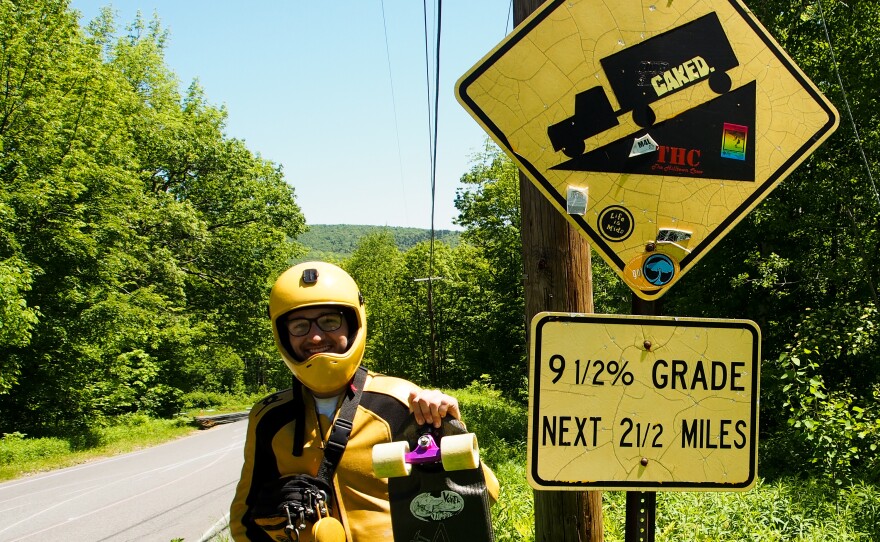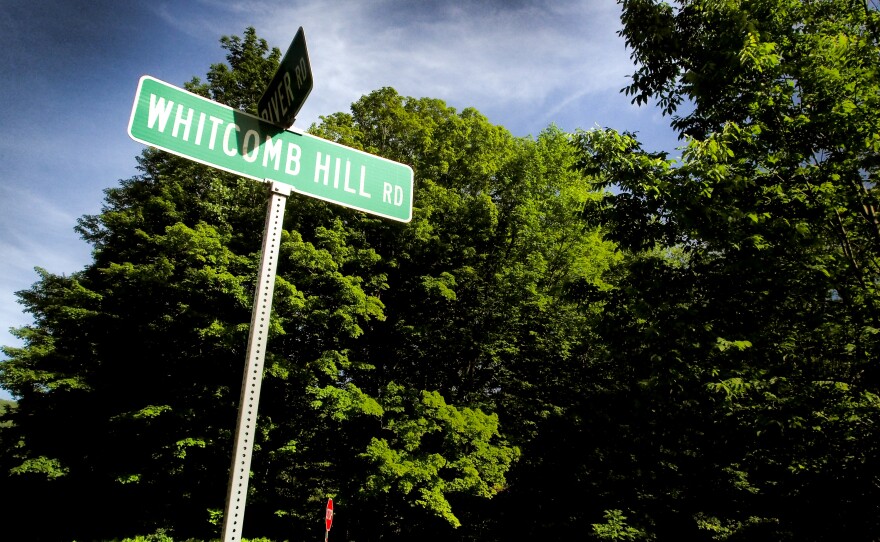More than 60 downhill skateboarders convened in a quiet western Massachusetts town in June — coming from as far away as Spain, Australia, and Mexico — to compete in the first-ever Whitcomb Summit Downhill.
There’s a sign near the highest point on Route 2 in Florida, Massachusetts, that downhill skateboarder Jeff Molongoski, 54, has been contemplating for years. The sign says the road grade is 9 ½ percent for the next 2 ½ miles.
When workers carved the outrageously-steep Whitcomb Hill Road out of the mountain, none of them could have pictured the event that Molongoski and his son would host at the spot in 2019.

Participants said the pace for the fastest skaters at the event topped 70 miles per hour — or “a mellow 70,” as one of them said.
That “mellow” excess of speed was just what Molongoski was after. He recalled the moment three years ago when his son, Ryder, first told him about improvements that had been made to the road.
“He calls up and he goes, ‘You’re not going to believe it, Whitcomb got paved top-to-bottom,’” Molongoski said. “So it was just amazing — and we started skating it right away.”
Ryder Molongoski said he and his dad skated the road in traffic for years, sometimes incurring the ire of drivers or local residents.
“Eventually, the cops started coming every time we came,” Ryder said. “So we decided to go to the town to ask them for one weekend just to really live it up. And they gave it to us.”
The road was officially closed from 9 a.m. to 5 p.m. on both days of the event.
Emily Pross, a four-time women’s downhill skateboarding world champion, said Whitcomb Hill was the fastest racetrack she’d ever skated.

Matt Cook and Mike Walker drove out from North Adams, Massachusetts, to watch the racers shoot by.
“Man, that was freaking killer,” Cook said. “They were going wicked fast, I’ll tell you what.”
Cook admired the crouched postures, or “speed tucks,” the racers assumed in the straightaways: one forward-facing foot in front of the other, hands grasped behind their backs.
“We got full leather suits going on,” Cook said. “Skin tight, to make them be able to go fast, and all that. And then they got stormtrooper helmets on. And it’s freakin’ awesome.”
Max Capps, a racer from southern California, described his first runs on the track.
“Yesterday morning, I was terrified,” he said. “And then by the end of the day, I finally had it figured out. Now I’m like, I can race this. Yesterday, I didn’t feel like I could race this.”

Capps was skating Whitcomb with his teammate, Tim Delrosario-Rojas, who said when he’s riding well, the experience is actually calming.
“Definitely, you find a place of meditation, is what I’d call it,” Delrosario-Rojas said. “Like the stillest point you can find is when you’re on the board.”
That was true for some skaters, at least.
For others, their runs down the mountain ended with a wipeout against one of the 1,500 hay bales the Molongoskis set out along the length of the route.
The bales were especially crucial at a spot called “the left slide,” where spectators groaned as skaters crashed full-on into the bales, then laughed in relief as the skaters stood up, unscathed.
“Go, go, go!” a spectator yelled, as one racer picked himself off the ground and hopped back on his board.
Between runs, the Molongoskis opened the road to waiting traffic. A few trucks and motorcycles went by, the acrid smell of their burning brakes mixing with marijuana fumes and the odor of sizzling burgers.
The guy flipping burgers was Mike Gleason, the fire chief.
“Fire and rescue,” Gleason said, adding that he was totally in support of closing the road for the downhill event.
But he did express some doubts about the skaters’ judgement.
“They’re nuts,” he said. “They’re absolutely crazy. I wouldn’t do it.”
After a quick break at the bottom, the skaters packed themselves into two U-Hauls. A few racers sat hunched over in the “grandma’s attic” section of the vehicle. Others stood shoulder-to-shoulder in their brightly-colored leather suits, a few singing along enthusiastically to Whitney Houston’s “I Wanna Dance With Somebody.”
Volunteers drove them back to the top for their next run.
Uldis Tretmanis, from Mexico, was the oldest skater at the event. He’s a board member for the International Downhill Federation.
“I have to continue ’til I die, basically,” Tretmanis said. “Which is not too far down the line. I’m 57.”
Tretmanis blew out three vertebrae skating bowls back in his 40s. Now he rides downhill, he said, because it makes his back feel better.
It’s partly up to him whether this race will become a sanctioned IDF event starting next year.
“I’m the guy in charge of safety,” he said.

A dislocated shoulder, at least one sprained ankle, some deep road rash: among 60-odd skaters, these were the worst of the reported injuries.
EMTs had already checked skater Norman Plante by the time Ryder Molongoski spotted him.
“Norm, no!” Molongoski bellowed. “What happened?”
Plante had bandages on his knees. His pants were off, and there was a ragged hole through his boxers at the left butt cheek.
“I fell forward off it on my hip,” Plante said. “Got some on my knees.”
A fellow skater leaned close to Plante’s rear end and commented on how he could “see the white” inside the wound.
“Dude,” he said, “that’s gonna hurt a lot.”
Moments later, the four finalists in the championship race came speeding down the hill, shouting ecstatically as they slid their boards to a controlled stop. Among them were teammates Capps and Delrosario-Rojas.
No one was tending the finish line. It was just a chalk mark across the road, and it was up to the competitors themselves to explain who had won.
“Yeah, Tim!” a racer shouted.
“Tim in the final straight. So fast!” another racer chimed in.
Ryder Molongoski was in the mix, congratulating the winner. You could tell he was just incredibly pleased that this race, put together with his dad, had gone off without a hitch.













